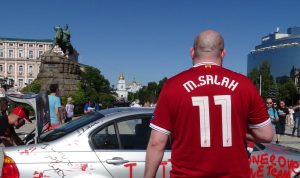Originally posted 2019-06-09 03:31:10.
By Ala' Alrababa'h, William Marble, Salma Mousa, Alexandra Siegel
 Can exposure to successful celebrities from stigmatized groups reduce prejudice toward that group at large? We exploit the sudden and phenomenal rise to fame of Liverpool F.C. soccer star Mohamed Salah, a visibly Muslim player, to answer this question.
Can exposure to successful celebrities from stigmatized groups reduce prejudice toward that group at large? We exploit the sudden and phenomenal rise to fame of Liverpool F.C. soccer star Mohamed Salah, a visibly Muslim player, to answer this question.
We causally estimate the effect of Mohamed Salah joining Liverpool F.C. on Islamophobic attitudes and behaviors using 936 county-month hate crime observations, 15 million tweets from U.K. soccer fans, and an original survey experiment of 8,060 Liverpool F.C. fans.
We find that Merseyside county (home to Liverpool F.C.) experienced a 18.9% drop in hate crimes relative to a synthetic control, while no similar effect was found for other types of crime. We also find that Liverpool F.C. fans halved their rates of posting anti-Muslim tweets (a drop from 7.3% to 3.8% of tweets about Muslims) relative to fans of other top-flight English soccer clubs.
The survey experiment suggests that these results may be driven by increased familiarity
Our findings indicate that positive exposure to outgroup role models can reveal new information that humanizes the outgroup writ large.
